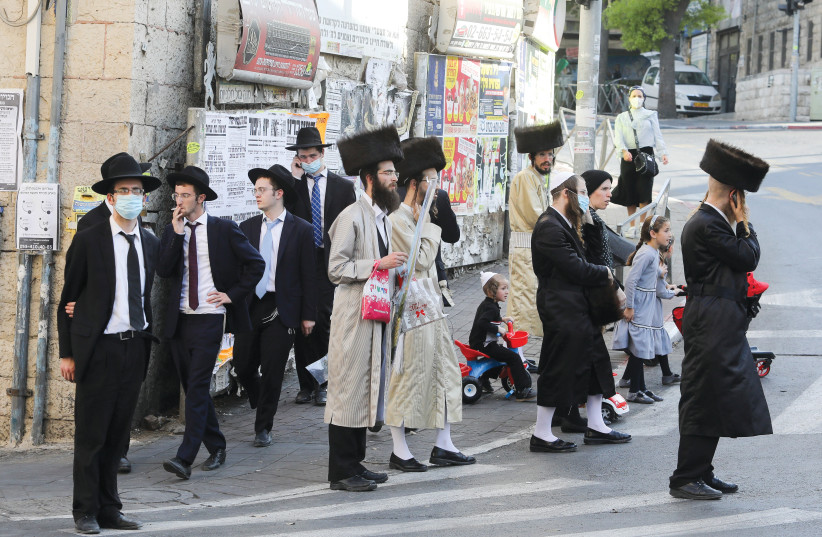As Israel approaches 75 years of existence, it faces significant challenges and threats. In the immediate term, Israelis continue to endure endless Palestinian terrorism and rejectionism, not to mention an unrelenting international Boycott, Divestment and Sanctions (BDS) movement, whose goal is the delegitimization and destruction of the Jewish state.
To the north, Hezbollah has amassed a stockpile of 150,000 rockets, including missiles capable of striking every major Israeli city, as well as Ben-Gurion International Airport. More ominously, Iran is reportedly closer than ever to obtaining a nuclear weapon, posing an existential threat to Israel.
These threats, each one serious, are all external. There is, however, also a longer-term danger, one that is internal. In fact, it’s a ticking bomb with the very real potential to eviscerate Israel’s democratic nature: the rapid growth of the haredi (ultra-Orthodox) population and resultant expansion of haredi political power.
Non-haredi (secular and Modern Orthodox) Israelis have long felt the impact of growing haredi political power, particularly in economic terms. According to the Bank of Israel, a haredi family pays on average only NIS 1,500 in monthly taxes, whereas a non-haredi family pays NIS 4,500 – three times more. And now, with Benjamin Netanyahu again beholden to United Torah Judaism (UTJ) and Shas (the two haredi political parties in his newly formed governing coalition), subsidies to perennially unemployed, draft-exempt yeshiva students are likely to double. This is a recipe for economic catastrophe.
While American Jews may take note of this systemic inequality, obviously we aren’t directly impacted by it. Yet, that doesn’t mean we who are committed Zionists don’t have our own profound concerns about the implications of emboldened haredi political parties for Israel’s future (concerns, undoubtedly, shared by many Israelis).

Since 1948, Israel has always been able to count on American Jews’ emotional attachment to and support of the Jewish state. But what if the Israel of 2048, in which haredim are projected to grow to 25 percent of the population, is significantly less democratic and less pluralistic? How would we be able to sustain support for Israel if it has adopted far-reaching policies that are antithetical to the fundamental values and interests of American Jews, let alone those of a vast number of Israelis?
Currently, haredim make up 12.6% of the Israeli population, and their representation in the Knesset is 18 seats, or 15%. Assuming no future electoral reform that would diminish their leverage, imagine the power they will yield when their population doubles! Even today, the all-male haredi parties, backed by the Religious Zionist Party, are demanding gender segregation at publicly funded events, such as concerts, in publicly funded universities, and on public transportation, meaning women being forced to sit in the back of buses. If that sounds like Saudi Arabia, well…
Sadly, haredi rabbis in Israel have a long history of disparaging non-Orthodox Judaism. Unsurprisingly, then, UTJ and Shas (along with the Religious Zionist Party) want to revoke state recognition of non-Orthodox conversions to Judaism, thereby conveying a clear message to the majority of US Jews that their way of Jewish practice, be it Conservative, Reform or Reconstructionist, is illegitimate. UTJ, moreover, is seeking to ban mixed-gender prayer at the egalitarian section of the Western Wall.
If these haredi politicians had their way, they would also roll back the rights that LGBTQ Israelis have secured recently. Although Israel doesn’t permit same-sex marriage, the Israeli Supreme Court requires that same-sex marriages performed abroad be recognized by the state and has ensured that same-sex couples and transgender individuals be allowed to pursue surrogacy. At present, Netanyahu has promised to block efforts to eliminate these protections, but a future prime minister may not be able to withstand pressure from more powerful haredi parties.
What can Israel do to preclude a future Israel turning into a quasi-theocracy?
The government should take steps to integrate the haredim into modern society while still respecting their lifestyle. This includes enforcement of a requirement that haredi schools teach math, science and English (admittedly, unlikely to happen under the new coalition) and increased investment in vocational training for haredi men, making it easier to bring them into the modern workforce.
Electoral reform is also needed. One realistic option would be to guarantee the leader of the largest party the right to form a coalition. Such a change would hopefully incentivize more Israelis to vote for the larger mainstream parties as opposed to smaller sectarian parties that represent the narrow interests of certain sectors of Israeli society.
Unfortunately, shortsighted political expediency will likely lead to inaction. But if Israel keeps kicking this can down the road, it may find that there may no longer be ample American Jewish support left at the end of that road. ■
The writer is director of Community Relations and Public Affairs at the Jewish Federation of Greater Portland.
